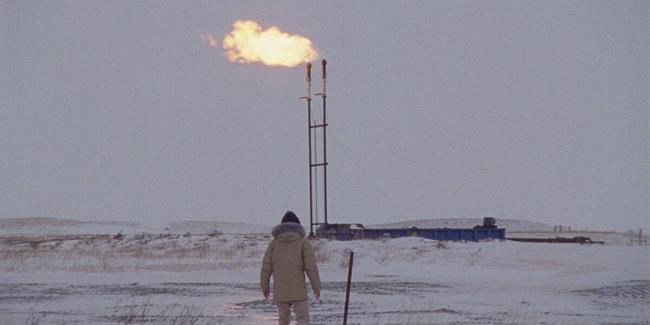
A scene from the film “How to Blow Up a Pipeline” is seen in an undated handout still image. THE CANADIAN PRESS/HO-Toronto International Film Festival, *MANDATORY CREDIT*
September 17, 2022 - 3:15 AM
The Toronto International Film Festival returned to its spectacular fashion this year with red carpet premieres galore and enough Oscar talk to go around.
But beyond the major Hollywood releases vying for attention, there were plenty of hidden gems causing chatter among festivalgoers.
Here's a look at five titles that flew under the radar at TIFF, but should land a spot on your must-see list as they're released in the coming months:
“How to Blow Up a Pipeline”
As the world slips into a deepening climate crisis, a group of young activists band together to plot the destruction of a West Texas pipeline. Their plan is to disrupt the oil market with a meticulous attack, but they aren’t ignorant of the ethical questions that haunt their actions. Director Daniel Goldhaber’s provocative thriller pieces together the stories of a disparate team so disillusioned by failed peaceful demonstrations that they’re willing to risk everything. Inspired partly by Andreas Malm’s 2021 manifesto, which calls sabotage and property damage a necessary form of climate activism, “How to Blow Up a Pipeline” is an incendiary shot aimed directly at the fossil fuels industry. (Release date to be determined.)
“Bruiser”
When 14-year-old Darious returns to his parents' home in the southern United States after being away at private school, he struggles to connect with the local kids. One afternoon, after losing a brawl, he wanders into the woods where he meets a charismatic stranger, played by “Moonlight” star Trevante Rhodes. The man, who's living in an abandoned houseboat, immediately connects with Darious, raising the concerns of his strict father Malcolm, portrayed in a simmering performance by Toronto’s Shamier Anderson. But lingering secrets threaten to upend the household as Darious turns to a man he hardly knows as a father figure. Based on his short film, Miles Warren’s powder keg feature directorial debut interrogates generational violence and the ripples of toxic masculinity in the Black community with a careful hand and an impactful finale. (Release date to be determined.)
“Riceboy Sleeps”
Set in the 1990s, Vancouver writer-director Anthony Shim’s breakout second feature delicately explores the ruptures that form between a South Korean single mom and her teenage son as they start anew in Canada. Both face different paths of the immigrant experience and those nuances form the backbone of a deeply personal story drawn from Shim’s own life. "Riceboy Sleeps" will inevitably be compared to 2020's Korean-American film "Minari" by some, but its heart is more meditative, partly due to Christopher Lew's gentle and mesmerizing cinematography. Lead actress Choi Seung-yoon delivers a vulnerable performance, while Ethan Hwang's understated role as a conflicted teen is a reminder of how few Asian male adolescents get ample screen time in North American films. (Coming to theatres in early 2023.)
“Muru”
Filmmaker Tearepa Kahi draws on a century of colonial violence to fuel his action-thriller set during the 2007 New Zealand police raids on an Indigenous community they believed was harbouring a domestic terrorist cell. The story centres on a fictional police sergeant in the Tuho community, who is caught between his job and protecting his people against brutal forces that have moved onto their land without warning. While "Muru" isn't a factual account of the historic incident, it doesn't pretend to be either. "This film is not a recreation of the police raids," a message reads near the onset. "It is a response." That gives Kahi room to conjure up a suspenseful and often brutal version of the events that feels like a guttural cry for the protection of threatened identity. (Release date to be determined.)
“While We Watched”
With television news outlets slipping into sensationalist agendas across the world, documentarian Vinay Shukla turns his lens to India where respected NDTV reporter Ravish Kumar's show is under threat. Declining viewership numbers, deep budget cuts and death threats have put extra pressure on the veteran journalist's day-to-day life. But Kumar isn’t giving in, even as his voice is drowned out by rival networks who toe the government line and ignore stories about the more impoverished locals. Told at a breakneck pace, Shukla's film tracks his dogged determination to maintain news independence, even when it appears the battle is being lost. "While We Watched" is focused on one country, but its warning defies borders. (Release date to be determined.)
This report by The Canadian Press was first published Sept. 17, 2022.
News from © The Canadian Press, 2022